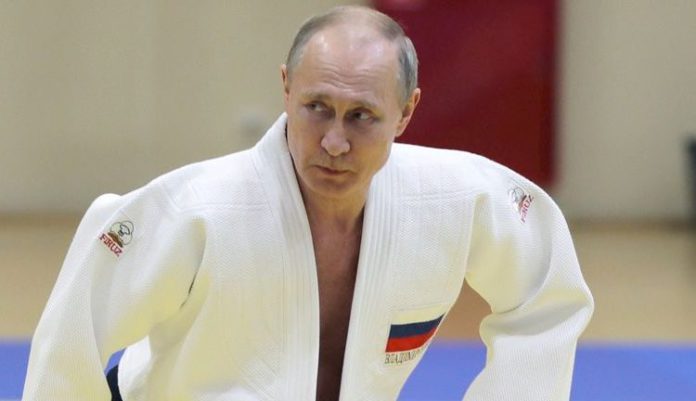Vladimir Putin is set to declare an all-out war on Ukraine allowing for mass mobilisation of Russians to launch “payback” over a stuttering invasion, say Russian sources and Western officials.
When tanks rolled into Ukraine at the end of February, Putin called it a “special operation” and even barred Russian media from using the word “war”.
But more than two months later, the offensive has stalled and army chiefs are believed to want it to now be called a war which would allow for mass mobilisation.
“The military are outraged that the blitz on Kyiv has failed,” a source close to Russian military officials told The Telegraph.
“People in the army are seeking payback for failures of the past and they want to go further in Ukraine. It seems their calls are being heard.
Defence Secretary Ben Wallace on Thursday said Putin was likely to announce general mobilisation of the Russian population within weeks to make up for military losses.
“He is probably going to declare…that we are now at war with the world’s Nazis and we need to mass mobilise the Russian people,” he said.
Adding the announcement could come on May 9 when Russia celebrates the victory of the Soviet army over Nazi Germany.
The Kremlin has typically showered the armed forces with funding and praise while sabre rattling at any opportunity – in part to make up for humiliating military campaigns over the last few decades, including in Afghanistan and Chechnya.
The strengthened armed forces now appear to be frustrated with a scaled-down offensive in eastern Ukraine, when Moscow had once looked set to take Kyiv in the early days of the war.
Igor Girkin, a retired military intelligence officer who led separatist forces in eastern Ukraine before being recalled to Moscow in 2014, has over the years provided a window into the thinking of rank-and-file Russian officers.
Known for his rabidly anti-Ukraine views, Girkin has lashed out online at the Kremlin for being too soft on Ukraine.
After reeling off a list of Moscow’s failures – from the sinking of the flagship of its Black Sea fleet to “acts of sabotage” against infrastructure within Russia – he asked: “What else has to happen before the dwarves in the Kremlin realise they are in an all-out, harsh war and start to act accordingly?”
Alexander Arutyunov, a retired Russian commando and usually one of the country’s most popular pro-Kremlin bloggers, has turned into another voice of discontent.
“Vladimir Vladimirovich, can you please make up your mind: are we fighting or are we playing around?” he asked in one emotional video. He questioned why Russia had yet to turn Ukraine’s airfields into “lunar craters”.
Declaring all-out war with Ukraine would entail two things the Kremlin has so far tried to avoid: martial law and mass mobilisation.
Mobilisation would mean Russia will need to call up reservists and keep conscripts beyond their one-year term, a politically fraught decision. Martial law would close the country’s borders and nationalise swathes of the economy which is already hanging by a thread.
Putin has been anxious to maintain a semblance of normality in Russia amid crippling Western sanctions, ordering his cabinet to come up with financial aid for families and businesses.
Liberal economists in the Kremlin service have so far staved off switching Russia’s once vibrant market economy to a wartime mode, deflecting attempts to nationalise Western businesses, among other things.
But one of Putin’s closest advisers in a rare public intervention this week spoke out for moving the economy onto a war footing.
Nikolai Patrushev, chairman of the Russian Security Council, criticised “entrepreneurs’ fascination with market mechanisms” and called for a self-sufficient economy.
Russia is also a member of the Collective Security Treaty Organisation (CSTO) that includes several other former Soviet nations. As with NATO, its charter says that an aggression against one member should be perceived as aggression against the whole of the bloc – and there could be a joint military response if Putin said Ukraine or the West were attacking Russia.
When violent unrest erupted in Kazakhstan in January this year, the CSTO agreed to send a joint peacekeeping mission there.
But other members, however, do not have militaries even remotely as big as Moscow’s.
At the same time a Ukraine interior minister advisor said Gen Gerasimov, head of the Russian army, had arrived in Eastern Ukraine.
Former Major General Rupert Jones, who was the commander of all operations on UK territory, told The Telegraph, that it would be a surprising move and show Putin’s growing isolation.
“This smells of further desperation,” he said, adding that the appointment could be a “precursor move” to Putin calling for a declaration of war on May 9.
“Putin has worked with Gerasimov for a very long time,” Maj Gen Jones said.
“But at the critical moment Putin doesn’t feel he needs his strategic commander in Moscow advising him. There’s something quite interesting in that dynamic, it reinforces (the idea of) Putin’s isolation.”

